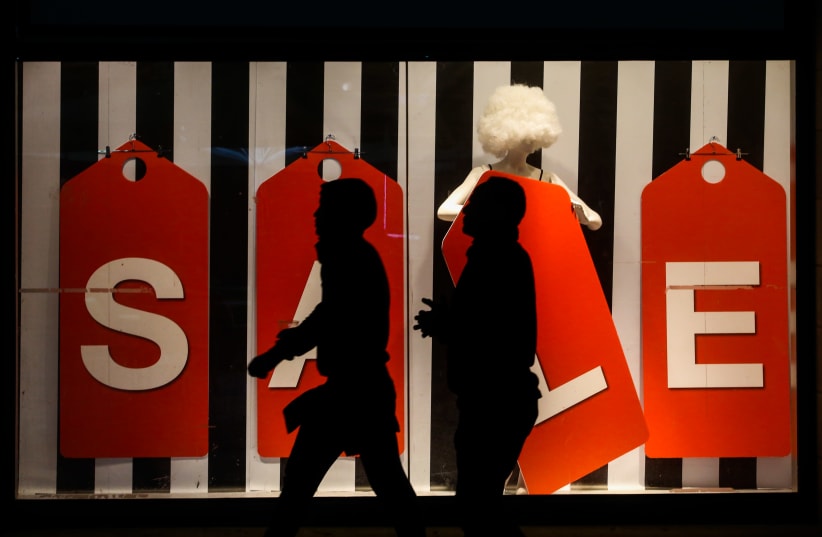Hamas is facing widespread criticism after hundreds of Palestinians converged on a new shopping mall that opened in the Gaza Strip last week, defying a ban on gatherings to curb the spread of the coronavirus pandemic.
The new Hype Mall in the Nuseirat refugee camp, owned by al-Danaf Group, is one of the biggest projects in the Hamas-ruled coastal enclave.
The mall management announced on April 15 that it would not hold an inauguration ceremony due to the coronavirus crisis and out of respect for the families of the 25 Palestinians who were killed in a gas explosion at the Nuseirat camp last month. As soon as the mall was opened, however, hundreds of Palestinians thronged its new stores, ignoring safety instructions regarding the coronavirus. Several Palestinians criticized Hamas for permitting the mall to open without taking precautionary measures to prevent the spread of the virus. Some claimed that the owners of the mall were closely associated with senior Hamas leaders and that’s why they were allowed to open the shopping center during the crisis. Other Palestinians said that it was inconceivable that Hamas would allow a shopping mall to open at a time when it has closed all mosques in the Gaza Strip to stem the spread of the virus. “It’s all politics,” said Salah Shehadeh, a resident of Gaza City. “Hamas feels free to do whatever it wants; it has shut all the mosques and suspended Friday prayers because of the coronavirus. Are malls more important than our mosques?” Mahmoud Alami, another resident of the Gaza Strip, said many people were angry with Hamas for allowing the mall to open, endangering the lives of hundreds of people. “The Hamas leaders are lying to us,” he said. “On the one hand, they are saying that they are taking strict measures to combat the coronavirus; on the other hand, we saw hundreds of people at the new mall without precautionary measures. Hamas knew that the mall was going to open. Why didn’t they take precautionary measures to prevent the people from gathering there?” A number of Palestinians in the Gaza Strip told The Jerusalem Post that the scenes at Hyper Mall last week were not unique. “You can still see many people in other shopping centers in different parts of the Gaza Strip,” said Abdel Karim Mansour, a resident of Shati refugee camp. In response to the protests, Prosecutor-General Diad al-Din al-Madhoun announced that he has ordered an investigation into the circumstances surrounding the opening of the mall. He said that legal measures would be taken against anyone who is found to have operated in violation of instructions to prevent the spread of the virus. Eyad al-Bozom, spokesman for the Hamas-controlled Interior Ministry, said on Sunday that the authorities in the Gaza Strip have already contacted the owners of the mall as part of the investigation. Al-Bozom insisted that the owners had taken the necessary precautionary measures before the opening of the mall. But, he said, “a large number of residents entered the mall, and the situation there became difficult. The case is now under investigation. This incident shows that there are still many people here who don't take seriously the instructions to prevent the spread of the disease. This should serve as a warning to all.” The spokesman pointed out that Hamas has taken several measures to stem the spread of the virus in the Gaza Strip, including a ban on gatherings, and closure of wedding halls, beach resorts, restaurants, coffee shops and mosques. “Some 1,632 Palestinians who were stranded on the Egyptian side of the Rafah border crossing entered the Gaza Strip in the past four days,” al-Bozom told the Palestine Satellite Channel. “They include patients, the elderly, and students. All the returnees have been placed in quarantine at several quarantine centers.” After the Palestinians returned to the Gaza Strip, the Rafah terminal was again closed in both directions. On March 15, another 1,000 Palestinians were allowed to return to the Gaza Strip. They too were placed in quarantine for 21 days. “Our quarantine centers provide all the services to the people,” al-Bozom added. “We are taking difficult and complicated measures to ensure the safety of the returnees. We have detailed plans for dealing with those returning to the Gaza Strip. We coordinated their return with the Egyptians.” Some Palestinians, he said, “still don’t understand the seriousness of the situation. In the Gaza Strip we are making huge efforts to avoid a major outbreak of the pandemic. Unfortunately, we still have a situation where people continue to ignore the instructions regarding the coronavirus pandemic.”
